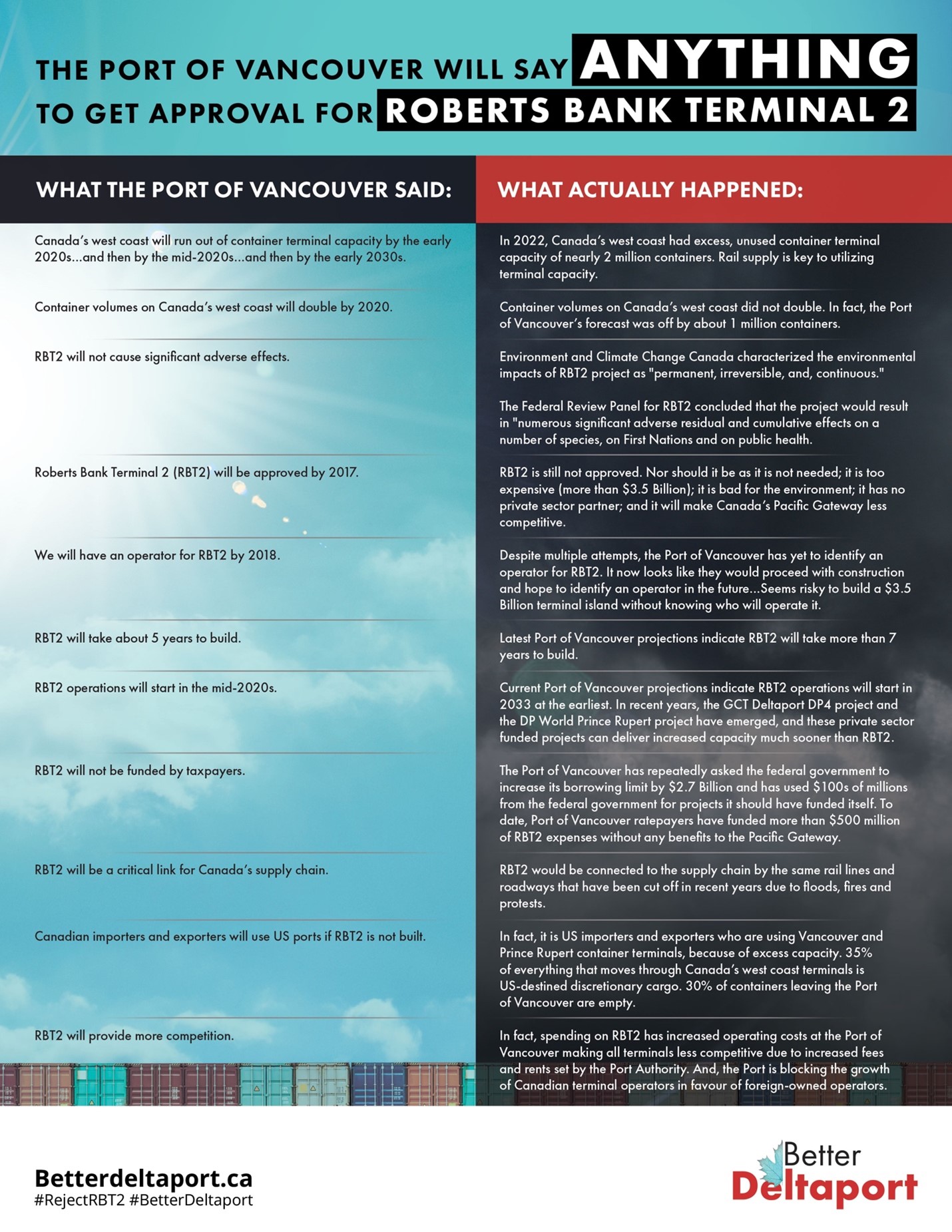There is a big difference between what the Port of Vancouver has said over the past decade as it tried to get
approval for its flawed and unnecessary Roberts Bank Terminal 2 project versus what actually happened.
For the past 20 years, the Port of Vancouver has been the proponent of a ~$3.5 billion taxpayer-funded, new
artificial island container terminal megaproject called Roberts Bank Terminal 2 (RBT2). RBT2 is a major economic and
environmental risk and is NOT in the best interests of Canada.
| What the Port of Vancouver said over the past
decade: |
What actually happened: |
| Canada’s west coast will run out of container
terminal capacity by the early 2020s…and then by the mid-2020s…and then by the early 2030s. |
In 2022, Canada’s west coast had excess, unused
container terminal capacity of nearly 2 million containers. Rail supply is key to utilizing terminal
capacity. |
| Container volumes on Canada’s west coast will
double by 2020. |
Container volumes on Canada’s west coast did not double. In fact, the Port of Vancouver’s forecast was off by about 1 million containers. |
| RBT2 will not cause significant adverse
effects. |
Environment and Climate Change Canada characterized the environmental impacts of RBT2 project as "permanent, irreversible, and, continuous." The Federal Review Panel for RBT2 concluded that the project would result in "numerous significant adverse residual and cumulative effects on a number of species, on First Nations and on public health. |
| Roberts Bank Terminal 2 (RBT2) will be approved by 2017. |
RBT2 is still not approved. Nor should it be as it is not needed; it is too expensive (more than $3.5 Billion); it is bad for the environment; it has no private sector partner; and it will make Canada’s Pacific Gateway less competitive. |
| We will have an operator for RBT2 by 2018. |
Despite multiple attempts, the Port of Vancouver has yet to identify an operator for RBT2. It now looks like they would proceed with construction and hope to identify an operator in the future…Seems risky to build a $3.5 Billion terminal island without knowing who will operate it. |
| RBT2 will take about 5 years to build. |
Latest Port of Vancouver projections indicate RBT2 will take more than 7 years to build. |
| RBT2 operations will start in the mid 2020s. |
Current Port of Vancouver projections indicate RBT2 operations will start in 2033 at the earliest. In recent years, the GCT Deltaport DP4 project and the DP World Prince Rupert project have emerged, and these private sector funded projects can deliver increased capacity much sooner than RBT2. |
| RBT2 will not be funded by taxpayers. |
The Port of Vancouver has repeatedly asked the federal government to increase its borrowing limit by $2.7 Billion and has used $100s of millions from the federal government for projects it should have funded itself. To date, Port of Vancouver ratepayers have funded more than $500 million of RBT2 expenses without any benefits to the Pacific Gateway. |
| RBT2 will be a critical link for Canada’s supply chain. |
RBT2 would be connected to the supply chain by the same rail lines and roadways that have been cut off in recent years due to floods, fires and protests. |
| Canadian importers and exporters will use US ports if RBT2 is not built. |
In fact, it is US importers and exporters who are using Vancouver and Prince Rupert container terminals, because of excess capacity. 35% of everything that moves through Canada’s west coast terminals is US-destined discretionary cargo. 30% of containers leaving the Port of Vancouver are empty. |
| RBT2 will provide more competition. |
In fact, spending on RBT2 has increased operating costs at the Port of Vancouver making all terminals less competitive due to increased fees and rents set by the Port Authority. And, the Port is blocking the growth of Canadian terminal operators in favour of foreign-owned operators. |
It is clear that the Vancouver Port Authority will say anything to have its flawed project approved. It is up to the Government to weigh the facts and act in the public interest. It’s time to #RejectRBT2.
Learn more at betterdeltaport.ca
